Deepak G. Pawar's Blog, page 11
February 1, 2017
Book conversation: The Girl on the Train
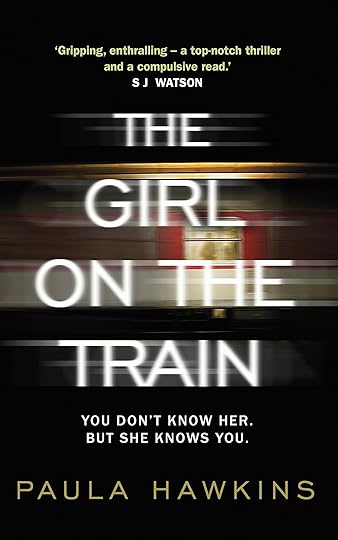
The Girl on the Train
Paula Hawkins
Random House 2015
Ever wondered what goes on in all those houses whose backyards you gaze at, as the London's tube that you are sitting in rolls onto its destination?
Hawkins takes this basic premise and adds the thriller/mystery element to it to come up with an engaging tale of secrets, murder, abuse and memories.
The main protagonist, Rachel is an atypical lead, in the sense that everything about her is rather depressing and dilapidated. She is divorced, she is fat, not too good looking, she loses her bearings quite often, and to top it all, she is hopelessly alcohol dependent.
Still, one can't help sympathizing with her, and hope that everything works out well for her in the end. And that, I think is what Hawkins has admirably achieved in this novel. Perhaps because of these very flaws, Rachel comes across as a relatable character.
I do like the format: the narrative taken forward through the eyes of the three women, told at different times and adding to the unfolding mystery. Then there are the leitmotifs: the trains and alcohol. In fact, the two go together, as Rachel continues to drink throughout while travelling on the tube.
There is enough of the mystery element to keep you engrossed till the end. The revelation and the sting in the tail are well depicted.
In the end, it is London's trains that remain with you; another character unto themselves in the book, with their screeching, undulating movements as they run back and forth along the tracks behind all those similar looking houses.
Image source: https://static.independent.co.uk/s3fs...
Published on February 01, 2017 00:11
January 12, 2017
Article on Sanskriti on veganism
Published on January 12, 2017 06:26
January 7, 2017
Book conversation: The Ivory Throne
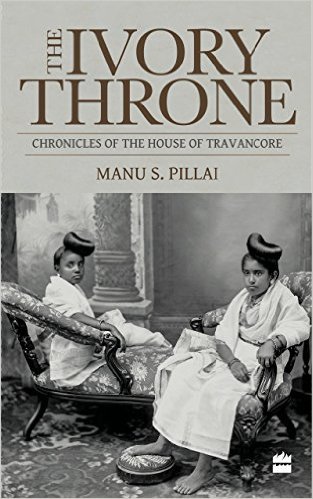
The Ivory Throne: Chronicles of the House of TravancoreManu S. PillaiHarper Collins India, 2015
We have all been intrigued by the news of the treasures underneath the Padmanabhaswamy Temple in Thiruvananthapuram. This was the carrot on the stick for me, for taking on the onerous task of perusing this nearly 600 page epic. It took some doing, but I was not disappointed. In the process, I was enlightened on the life of one of the most underrated and unrecognised royal figures of India: Queen Regent Sethu Lakshmi Bayi.
Manu S. Pillai takes on the gargantuan task of retelling the story of the Travancore Royal House and comes up trumps. Even though this is said to be his debut release, his proficiency in digging up voluminous historical records, chasing up those who know about the said history, and coming up with an engaging account of the royal family is not entirely surprising considering he has worked with the likes of Shashi Tharoor, who we know is an adept in this very field.
Throughout, Pillai's fondness towards Maharani Sethu Lakshmi Bayi is evident, as he goes about highlighting the goodness of her character, and her farsighted public works as the Queen Regent - something, he points out, even Gandhiji was in awe of. This is in contrast to the character of the Junior Maharani and her family, who come across as petty and scheming.
Palace intrigue, black magic, petty royal disputes, underhand political moves, colonial mores, and alleged profligacy - they are all there in ample measure, as the narrative makes an epic sweep of the history of late 19th and early 20th Century South Kerala region.
While nobody wanted a princely dominion to remain outside the nascent republic of India just after independence, it is nevertheless sad to note the gradual isolation and obviation of the Maharani. (Apparently her elder daughter first moved to Malleswaram in Bengaluru from Kerala - I would love to know where exactly, as I happen to live there.)
In addition to learning about the Queen, there are three less known pieces of information that stand out for me from the book: the early history of Kerala, when Vasco da Gama and his Portuguese sailors resorted to piracy in the Arabian sea before they could gain access to the markets of Kochithe unfortunate decline of the matrilineal system of family leadership after the British occupied India and forcibly applied their puritanical rules on the society Raja Ravi Varma's role in the royal life (he was the grandfather of the Maharani), and the fact that he was not a 'raja' at all!A little bit more information about the Ivory Throne itself would have been helpful. And Pillai talks about the ongoing temple treasure strife only towards the end, and points out that the matter is pending decision by the Supreme Court. It would be interesting to know what the verdict would be, especially since the current royal family that is involved in the legal imbroglio happens to be from the Junior Rani's side of the family.
Overall, a highly revealing and engaging scholarly work that is worth your time.
Image source: http://ecx.images-amazon.com/images/I...
Published on January 07, 2017 05:39
January 3, 2017
New year, what new year?
Apparently, the year has changed. 2016 has sadly passed away, and 2017 has just taken birth.

Revellers heralded the 'new year' by crying themselves hoarse shouting 'happy new year!!!', drank gazillions of intoxicants, harassed hapless lasses who made the mistake of being in their midst during their raucousness, and inflicted their 'precious' pictures of celebration on social media addicts.
Not to mention, as 12 O'Clock swept across the world from east to west, every country tried to outdo its neighbour by lighting up billions of bulbs and blowing up tons of fireworks to welcome the 'new year'.
(Yet, curiously it is only the Diwali fireworks that contribute to pollution every year).
So to summarise, the 'new year' party is done and dusted, and we are officially in the 'new year'.
Really? Sorry to burst the party bubble, but I don't feel anything different about the 'new year'.
Why, you ask? Here's why...
Because the whole concept of 'new year' is flawed, that's why.
Because we are blindly towing the West's line, and following the legacy of our land-occupiers, the British.
Because we are following somebody's idea of the 'year of the Lord', when we have lords of our own, and calendars of our own.
Because there are, at the last Wikipedia count, close to eighty different calendars across the world, each laying claim to its own 'near year day'.
Because as per the Gregorian calendar, the 'new year' starts seven days after the birthday of the founder of Christianity, which has no relevance to us.
Because the date of Christmas itself is a hotly contested and contentious issue across the world, with different cultures observing Christmas on different days of the year.
Because the date, 25th December was arrived at by the scholars of the past after much deliberation.
Because the earth's revolution cannot be exactly divided into units of time to accurately measure the onset of the 'new year'.
Because the world continues to be beset with problems as before, and we are no better or worse than we were last year, or for that matter five decades ago...
Therefore, I stopped making a fool out of myself 'at the stroke of the midnight hour', several years ago.
So let me repeat that. New year, what new year? Get on with your lives now...
Image source: https://merrychristmas2016-wishes.com...

Revellers heralded the 'new year' by crying themselves hoarse shouting 'happy new year!!!', drank gazillions of intoxicants, harassed hapless lasses who made the mistake of being in their midst during their raucousness, and inflicted their 'precious' pictures of celebration on social media addicts.
Not to mention, as 12 O'Clock swept across the world from east to west, every country tried to outdo its neighbour by lighting up billions of bulbs and blowing up tons of fireworks to welcome the 'new year'.
(Yet, curiously it is only the Diwali fireworks that contribute to pollution every year).
So to summarise, the 'new year' party is done and dusted, and we are officially in the 'new year'.
Really? Sorry to burst the party bubble, but I don't feel anything different about the 'new year'.
Why, you ask? Here's why...
Because the whole concept of 'new year' is flawed, that's why.
Because we are blindly towing the West's line, and following the legacy of our land-occupiers, the British.
Because we are following somebody's idea of the 'year of the Lord', when we have lords of our own, and calendars of our own.
Because there are, at the last Wikipedia count, close to eighty different calendars across the world, each laying claim to its own 'near year day'.
Because as per the Gregorian calendar, the 'new year' starts seven days after the birthday of the founder of Christianity, which has no relevance to us.
Because the date of Christmas itself is a hotly contested and contentious issue across the world, with different cultures observing Christmas on different days of the year.
Because the date, 25th December was arrived at by the scholars of the past after much deliberation.
Because the earth's revolution cannot be exactly divided into units of time to accurately measure the onset of the 'new year'.
Because the world continues to be beset with problems as before, and we are no better or worse than we were last year, or for that matter five decades ago...
Therefore, I stopped making a fool out of myself 'at the stroke of the midnight hour', several years ago.
So let me repeat that. New year, what new year? Get on with your lives now...
Image source: https://merrychristmas2016-wishes.com...
Published on January 03, 2017 22:30
Book conversation: How to be a Literary Sensation
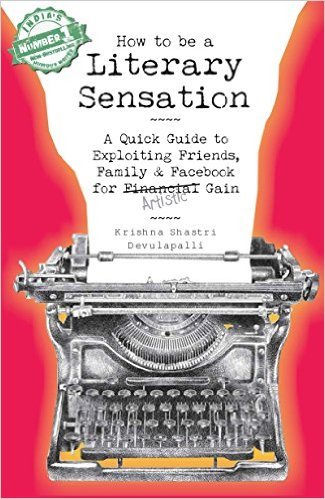
How to be a Literary Sensation
Krishna Shastri Devulapalli
Harper Collins India 2015
Krishna Shastri Devulapalli does to writing what Rishi Piparaiya does to flying, with an equally unpronounceable surname!
And the humour in this one is as good.
But I guess the joke's on me. Because - yes, I admit it - I took the title on its face value. Literally literally, if you like. And came a cropper.
The crossed out 'financial' replaced with 'artistic' should have given the clue. But I did not.
Because it has nothing to do with how to be a good writer.
The first half is about Devulapalli's encounters with some colourful characters from his life.
And the second half takes a dig on just about all aspects of a writerly life - including 'gas generated at lit fests', and his pet peeve: books on the theme of 'loss and redemption'.
There are several laugh-out-loud (LOL, silly!) moments.
I definitely won't be a 'literary sensation', but at least I had a good laugh.
So go for it if you have had enough of loss and redemption. (Whatever the hell that is, by the way...I mean BTW).
Image source: http://ecx.images-amazon.com/images/I...
Published on January 03, 2017 07:20
December 13, 2016
Film conversations: Kahaani 2
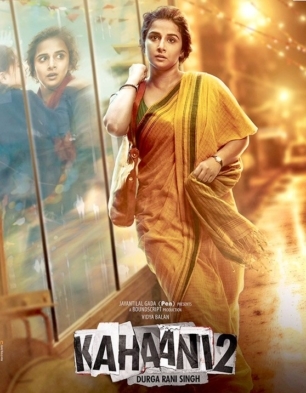
While the first one was advertised as 'a mother of a story' (and it was), the second one alludes to a different kind of motherhood.
The grittiness, realism, Kolkata, Bengali culture and accent, the lead actress, the director and the mystery element, all return in Kahaani 2, minus the other support cast from the first installment.
Nevertheless, some parallels are worth noting between 1 and 2: the ironic killer LIC agent from 1 is replaced by a killer female police officer; the abetting Bengali police officer is replaced by another non-Bengali police officer who also happens to be the main protagonist's ex-husband; and the doubting senior non-Bengali detective is replaced by another doubting Bengali police officer. Also present is the nondescript love interest of the main protagonist who has nothing much to do; and of course the mystery element from 1 that keeps you guessing throughout.
In all this, the film manages to make a serious point on child sexual abuse. The dubious culprit who is also the uncle of the child, the denying grandmother who invariably takes her son's side and blames the child for all things wrong, the attempts to cover-up - they are all there; and for most parts the makers manage to get the issues right.
But the issue is used only to add to the thriller aspect of the narrative, rather than to make a social point, as in Monsoon Wedding. Nevertheless, the grimness of this subject is matched amply by the bleakness of the backdrop and the deglamourised look sported by the lead protagonist.
Comparisons are no doubt, odious; but since this has been presented as Kahaani 2, one cannot help pit it against the first Kahaani. It is also true that sequels rarely ever steal a march over the first one, and this is no different.
Even though the tautness is there, it is no way as riveting or unpredictable as the first one. The sting in the tail certainly is not as surprising as the previous one. If anything, the fast pace and editing, which are probably meant to keep the story taut and interesting, take away the real feel of the lead character's personality and the reason why she is a recluse initially following her early life experiences, and how she transforms herself into a protective mother later.
A few loose threads hang about; for instance, why did the policeman - far too handsome to belong in a dilapidated small town police station - who was hand-in-glove with the mother all along, allow her to face the deadly duo all on her own towards the end? The mother, after having been declared 'officially dead', manages to emigrate to the US for the child's treatment, with only her name changed on the passport.
In spite of all this, I would go miles to see a quality film, as opposed to ego-inflated-superstar-oriented, ostentatious, self-glorifying, kahaani-less films.
Therefore, I highly recommend Kahaani 2, which is well worth your time and money, and will not disappoint you on the whole.
Image source: http://media3.bollywoodhungama.in/wp-...
Published on December 13, 2016 21:15
November 24, 2016
Book conversations: The Outsider
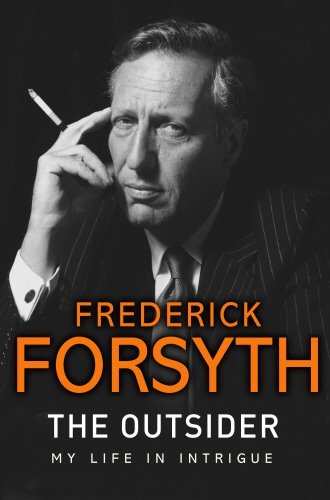
The Outsider: My Life in Intrigue
Frederick Forsyth
Bantam Press 2015
I must confess right at the beginning: I have not read a single book by Forsyth.
I only vaguely remember seeing The Day of the Jackal - the film, but other than that I don't know much about Forsyth's writings, except that they are mostly thrillers.
I read biographies mainly for the message from the life of the chief protagonist, and in this case, to know how Forsyth took to writing and managed to churn out so many bestsellers.
Right at the beginning, Forsyth makes it very clear that he does not like autobiographies, and that this work is not intended to be one. The book is arranged in the format of a series of significant events in Forsyth's life that are not only entertaining and informative, but when strung together, serve to connect his life in a continuum from childhood to his present state. So this is probably the closest you are going to get to an actual life-story of Forsyth in his own words.
And what a life-story it is! Don't be fooled by Forsyth's introductory words of finding solace in solitude so much so that it has become an essential requirement of his writerly life. This is only after he took to writing, which he humbly admits, happened by fluke.
Before all that, he has done so many things and has been to so many different places that one finally realizes that his writing is actually a result of experiences accrued during his hyperactive heydays. (He has been to many countries, that is, except India.) It is almost as if he was acquiring the raw materials required to put together a fruitful writing career in later life.
But from a writer's perspective, Forsyth's transformation from a state of an adventurer's and traveler's restlessness to a state of quietude and tranquility required to actually sit down for days at a stretch to write - on an old typewriter, we are told - novels after novels is stupefying.
One wishes that he had revealed how this transformation actually took place, what changes occurred in his lifestyle thereof, and how he managed these changes without upsetting his family - which is what every writer hopes to achieve in his/her life.
Instead, we get to learn about Forsyth's many adventures of his life; such as cross-country treks, hitchhiking, lessons in flying, learning new languages, and nearly triggering a third world war.
His foray into Japan teaches us about the geisha culture and he also talks about Buddhism and Shintoism. Indeed, he talks of every religion except Hinduism. I am not sure as to why India and Hinduism do not figure in his experiences; most obvious guess would be that he never came to India.
That apart, it is probably due to the fact that all things Indian do not feature prominently in the West's scheme of things, as Rajiv Malhotra would point out. Forsyth makes only a passing mention about 1947; that too in the context of some Israeli occurrence, with no mention of the other significant event of that year.
I suppose 1947 was a bit of a non-event for the Britishers in those days - the days of the Raj were done and dusted, and they had other local things to keep them occupied.
All in all, an entertaining read.
Forget Jackal, read this far more exciting account of its writer's own life.
Image source: https://images-na.ssl-images-amazon.c...
Published on November 24, 2016 07:22
November 12, 2016
Book conversation: Legacy
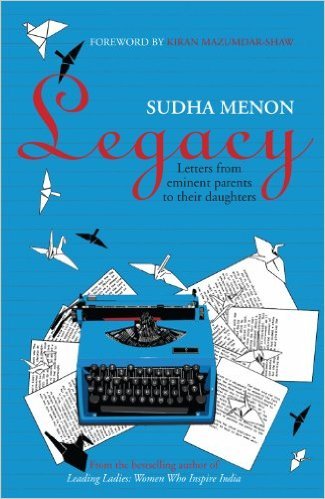
Legacy: Letters from Eminent Parents to their Daughters
Sudha Menon
Random House India, 2015
Legacy is an interesting one: it gets mothers and fathers, mostly famed industrialists and a few from other vocations, to write letters to their daughters. Why daughters, you ask? Perhaps it is to do with the newfound interest in all things feminine.
But put that aside, and you have a worthy collection of thoughts on making it big in life from those who went ahead and did it. The recurring theme across all the letters seems to be to find your passion in life - even if it happens to be offbeat - and work hard towards making yourself a success in the field.
Along the way, it also helps, they advice their children, to spread the goodness and help those less privileged than yourself.
The thoughts shared by most parents is in keeping with the notion that a positive outlook in life breeds further positivity in terms of material/monetary success and fulfilment.
Among the clutch of letter writers, all but one have written open letters to their daughters. Menon reveals some of the things that are to feature in the actual letters in the introduction to them, which takes away the freshness of the contents of the letters.
That apart, it must have taken a brave and persistent effort to pursue and convince some of the busiest professionals to share their intimate thoughts - something that each of them may well have preferred to reveal them in their own autobiographies. That makes this a commendable effort.
And yes, Legacy would make an ideal gift to someone you love.
Image source: http://ecx.images-amazon.com/images/I...
Published on November 12, 2016 06:55
October 15, 2016
Book review: Legal Confidential
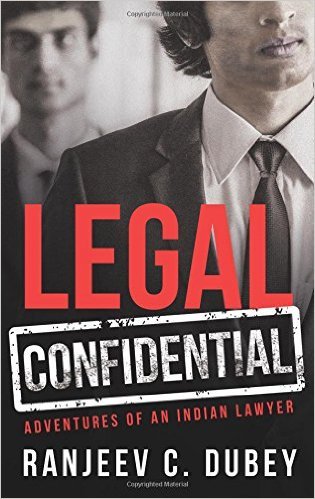
Legal Confidential: Adventures of an Indian Lawyer
Ranjeev C Dubey
Penguin Books India 2015
If like me, you believed that the legal system has been designed to help the wronged, uphold dharma, and deliver justice to one and all, think again. This book reveals the truth behind some of the notorious underhand deals that take place in the great Indian courts.
That our courts frequently fail to deliver justice to the aggrieved was a given, and I wrote as much in my book, Angst . But just how bad the system is, and the reasons why the legal system is bereft of any moral principles is revealed in this no-holds-barred account by Dubey.
The shortcomings of the legal system is laid threadbare even as Dubey recounts his own personal struggle with the system. Beginning with his struggling days at the Tees Hazari courts in Delhi, moving on to Dubey's liaison with the managers in the law firm that he is a part of, his struggles thereof, and his eventual exit from the company, it is one startling revelation after another.
Dubey does not mince words, and reveals the nature of the characters he encounters during his legal career, and their misdemeanours as he interprets them.
So we get to learn about the way Tees Hazari courts function, the role of the key players inside of a trial court, the corruption inherent in the legal system, the debauchery that some practitioners unhesitatingly indulge in, the unscrupulous nature of the legal system, the dog-eat-dog competitive nature amongst lawyers, and several examples of legal proceedings involving national, multinational and government agencies.
Dubey declares, rather ominously, that he learnt soon enough that justice didn't necessarily have a great deal to do with legal system.
And consider this damning excerpt from the book:
When the courts did function - about half the time they should have - I had myself a crash course in amoral pragmatism. I was bewildered by the idea that the legal community rarely looked at the rights and wrongs of any legal issue. As far as lawyers were concerned, there was the law, and then there were the loopholes. If they could fit the facts of their case into a loophole, well that was great. If they could not, they could change the facts to fit the loophole. When it comes to helping your client win a point, the truth had no space between two cynical lawyers and a bewildered court. No one tarried a moment before lying through their teeth, posturing about things they knew were untrue, or putting on an emotional drama based on complete fabrications. Within two years, I had become an existential nihilist: there was no objective truth in the world, only random data reinterpreted and packaged into a court case. I had discovered the ethical void.It is this ethical void that is probably responsible for all the cases of injustice that we get to see in the country: be it in the case of Jessica Lal, Nirbhaya, or the pampered superstar getting away with shooting animals and running over people.
The writing throughout the book has an irreverent, pithy, devil-may-care tone. Apart from the introductory note by the author, there are no other appendices, references, or acknowledgements, which sets the book apart from the usual narrative non-fictional accounts.
It would have been interesting to know about the role Dubey's family played in his struggles, which could have shed some light on just what goes on in the personal lives of legal eagles.
Towards the end, when you are screaming at Dubey not to listen to his chief tormentors, the narrative ends rather abruptly leaving you wondering if he did leave them to launch his own law firm. Does this mean there a sequel in the offing?
Also, is that his son on the cover page?
Image source: http://ecx.images-amazon.com/images/I...
Published on October 15, 2016 08:23
October 5, 2016
Book review: Beyond the Call of Duty

Beyond the Call of Duty
V Raghunathan & Veena Prasad
Harper Collins India 2015
We usually look back at the British Raj with derision - for very good reasons. However here is a book that shows the opposite: a look at the few notable exceptions to the usual horrid British agents, who went beyond their call of duty to work for the upliftment of the 'natives'; as in us. We usually only remember the Clives and the Simons, as their exploits are recounted in our history books, but this book comes up with a list of some well known and some less known names of British civil and/or military establishment. They worked - sometimes willingly, sometimes more indirectly - to make a difference to the society they were part of at the time.
So the book recounts the following names and their field of achievement in the period of the Raj:William Jones: Asiatic SocietyW H Sleeman: fighting the thug systemMountstuart Elphinstone: educationJames Prinsep: Indian history/geography & numismaticsArthur Thomas Cotton: building damsR M Stephenson & John Chapman: railwaysThe Cunningham brothers: archeology, Sikh history & advocacy of Mysore royaltyRonald Ross: malaria researchMark Tully: journalismOf these, Prinsep's story is astounding due to the sheer number of useful pursuits he undertook during his brief lifetime; Ross' painstaking research on the cause of malaria is awe-inspiring and gets the maximum coverage in the book; while Tully's is the only contemporary British example of any significant contribution to the Indian cause.
Raghunathan and Prasad relate the accounts of these gentlemen in an engaging manner, and their belief in the justness and magnanimity of their actions is evident throughout the book.
It is interesting to note that it was the Madras royalty of those days that conspired against the King of Mysore, which resulted in the annexation of the Mysore throne by the British.
I guess the inter-state rivalry between these two states predated the Cauvery issue!
Personally I would have liked to find out in depth about Francis Cunningham's role in the King of Mysore getting back his right to adopt a heir to the throne.
Nevertheless this is a noteworthy contribution, and should be taken into account by those looking to rename our towns, roads, circles and parks, so that deserving names such as those above are not erased in error.
The rest of the names, if at all retained, should be kept only to remind us of the grave error we committed in letting someone else occupy the country and loot it, so that this never happens again.
Another bonus is the watered-down but easy-to-understand-and-remember account of the establishment of colonial rule in India in the introduction to the book.
Image source: http://ecx.images-amazon.com/images/I...
Published on October 05, 2016 02:30



